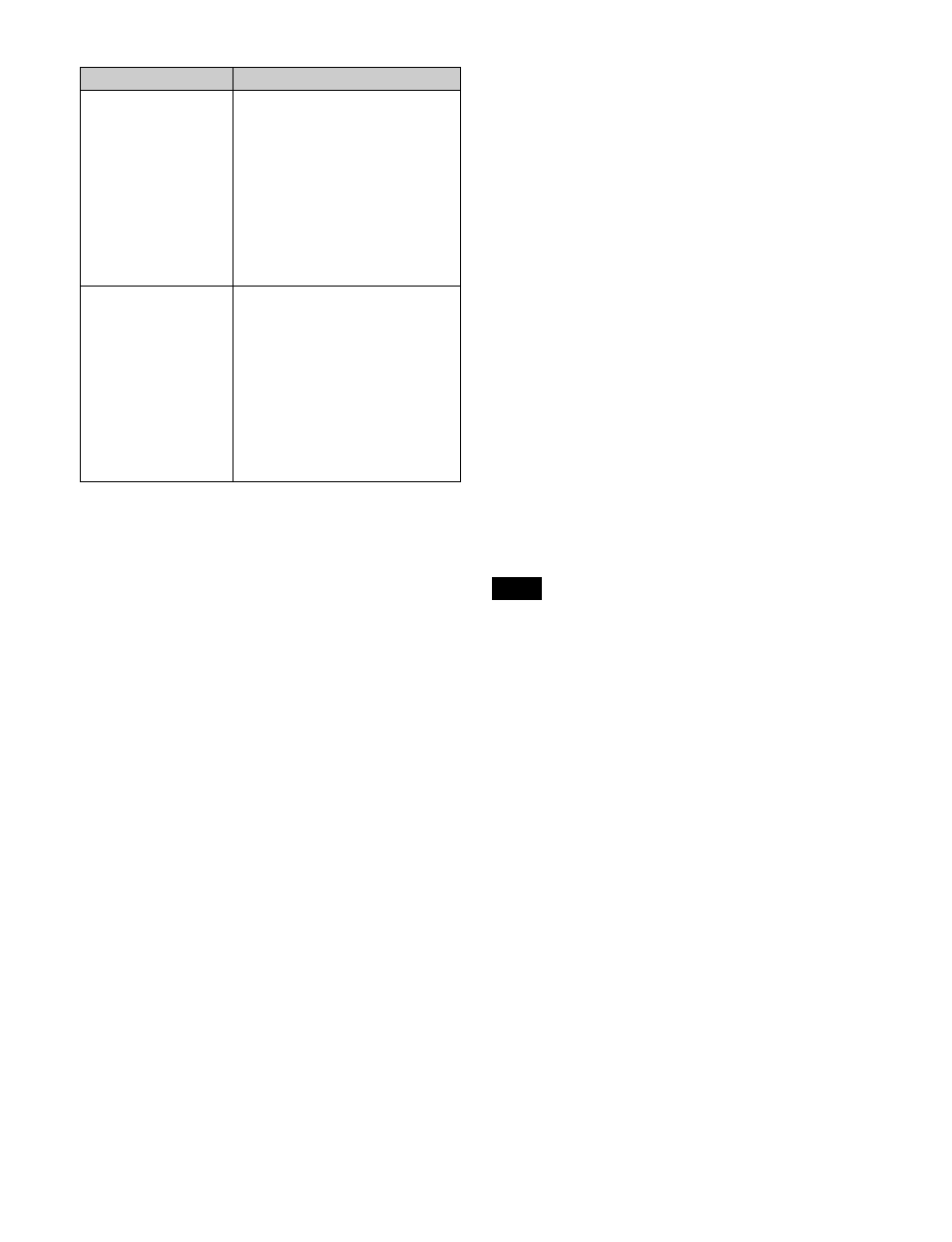Sony GP-X1EM Grip Extension User Manual
Page 24

24
a) When a cross-point button is pressed, a key fill signal is selected. While a
key bus delegation button is pressed, you can select a key fill signal on the
1st row and a key source signal on the 2nd row. The 2nd row uses the same
cross-point assign table as the 1st row.
b) Utility/shotbox mode functions are assigned in the Setup menu. The
settings are common to the M/E and PGM/PST banks.
For details, see “Assigning Functions to Cross-Point Buttons of the Cross-
Point Control Block” (page 428).
c) You can change the bus assignment and operation mode of the [UTIL]
button in the Setup menu.
For details, see “Setting Utility Bus Mode” (page 438) and “Setting the
[UTIL] button operation mode” (page 433).
Cross-point button numbers
The button numbers are labeled on the cross-point buttons.
For details, see “Cross-point control block button
numbers” (page 81).
Assigning signals to button numbers
You can assign a signal to each button number in the Setup
menu.
For details, see “Creating Cross-Point Assign Tables”
(page 415).
Colors of lit cross-point buttons
The status of cross-point buttons can be checked according
to the color of the button when lit.
For details, see “Colors of lit cross-point buttons”
(page 83).
Re-entry buttons
Re-entry buttons are assigned to the cross-point button
rows (M/E-4 and M/E-5 re-entry buttons must be assigned
in the Setup menu). Re-entry buttons can also be assigned
to the cross-point pad.
For details about re-entry buttons, see “Re-entry buttons”
(page 77).
SHIFT button
The [SHIFT] button function is assigned to the button on
the right-hand end, and is used to toggle between the
shifted and unshifted states of the button row.
The operation of the [SHIFT] button can be set to one of
the following modes in the Setup menu.
• The shifted state is selected while the button is pressed
(hold mode).
• Every time the button is pressed, it toggles between
shifted and unshifted states (lock mode).
You can also disable the [SHIFT] button function.
For details, see “Setting the [SHIFT] button operation
mode” (page 416).
SHIFT ALL button
You can switch the cross-point button rows on all buses to
the shifted state using the [SHIFT ALL] button assigned to
the cross-point pad. The [SHIFT ALL] button operation
can be set to hold mode or lock mode in the Setup menu.
For details, see “Setting the [SHIFT ALL] button
operation mode” (page 416).
The [SHIFT ALL] button is not available when a M/E or
PGM/PST bank is in the following states.
• When dual background bus mode is set
• When set to [Dual M/E Assign]
• When the operation of the [SHIFT] button of a cross-
point button row is set to hold mode
Cross-point hold function
Setting cross-point hold enables you to recall a keyframe
or snapshot while keeping the current cross-point selection
unchanged.
When cross-point hold is set, use the cross-point hold
buttons of the cross-point pad.
To set for each bus, press the cross-point hold button for
the target bus, turning the button indicator on.
To set for each cross-point button row, press the 1st row to
4th row cross-point hold buttons, turning the button
indicators on.
You can check whether cross-point hold is set for a key bus
(K1 to K8), utility bus (U1, U2), or background bus (A, B)
on the cross-point hold status display assigned to the cross-
point pad button.
3rd row
• Selects background A bus
signal.
• Selects the utility 1 bus signal
while the [UTIL] button of the
cross-point pad is pressed (utility
bus mode).
c)
• Selects the bus signal or utility/
shotbox function
b)
selected by a
delegation button on the cross-
point pad when free assign mode
is set.
4th row
• Selects background B bus
signal.
• Selects the utility 2 bus signal
while the [UTIL] button of the
cross-point pad is pressed (utility
bus mode).
c)
• Selects the bus signal or utility/
shotbox function
b)
selected by a
delegation button on the cross-
point pad when free assign mode
is set.
Name
Description
Note
